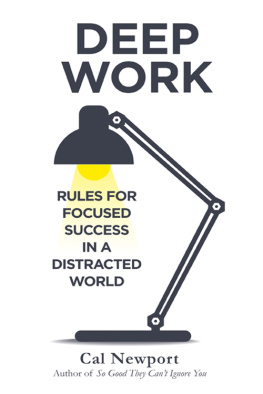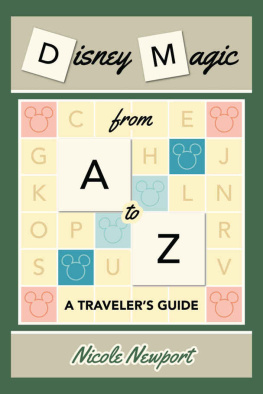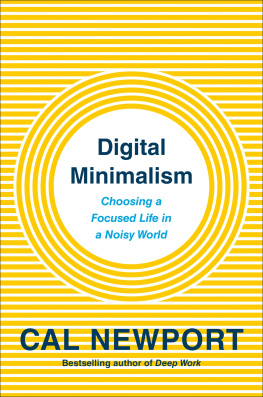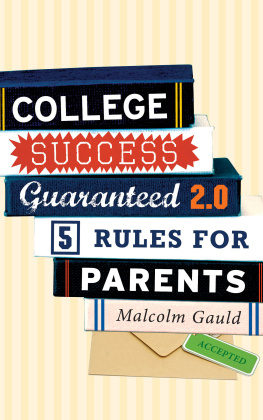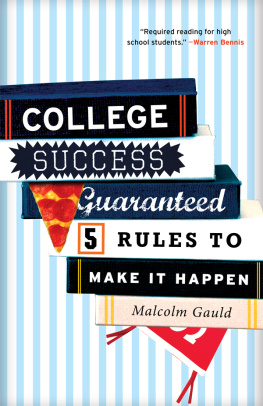
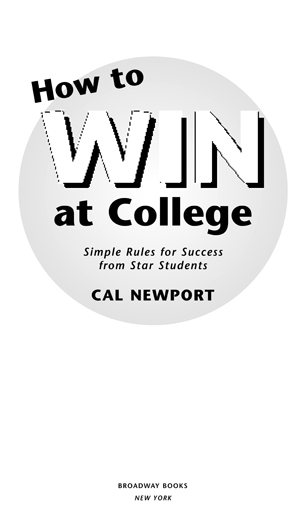
Contents
Introduction
College. You've probably been hearing about it and planning for it for years, and now, it's finally here. The SATs are over, your application's been accepted, and high school is soon to become just another fading memory. You're about to embark on a great adventureone you'll remember your entire life.
There is no question that college is a lot of fun. It's four years of freedom and excitement and growth. Staying out until two A.M. partying, and staying up until dawn talking with friends. Reveling in the chaos of cramming for midterms, and discovering how to appreciate dining hall food. Learning how to write a powerful, persuasive paper, and figuring out how to transform your bedsheet into a toga. Trust me when I say that you're in for a good time.
However, there is more to four years of college than amusement. It's also the launching pad for the rest of your life. The tough truth is that getting a good job these days is hard. Getting accepted to a good law school, graduate school, or medical school is also hard. You have just four short years to prepare yourself for the world beyond your college campus. If you play your cards right, you will have the ability to engage in any pursuit that inspires you. If you don't make the most of these four years, getting started on an exciting and fulfilling life path will be much more difficult.
Is it possible to be successful at college and still have fun? When I first arrived at school, I didn't think so. I thought there was no way that you could both enjoy college life and excel as a student. As I saw it, there were two choices: you could be fun and social and put all your energy into meeting people and having memorable experiences, or you could be a grind, and while away your weekend hours studying in the depths of the library. I truly didn't believe you could do both. Until, that is, I met Heidi.
Everyone liked Heidi. She was fun and outgoing, she knew tons of people, and she seemed to exude energy. It was clear that she was having a good time at college. But here's the catch: she was also a Rhodes Scholar. Not to mention a published author in the field of mathematics, a winner of a National Science Foundation Graduate Research Fellowship, and the founder of a successful community service organization for young girls.
I also met Kabir. He was a fun-loving member of a fraternity I frequented, a musician in a popular campus jazz group, and an all-around sociable guy. However, when I really got to know him, I discovered that he was also the CEO of a start-up company, a co-founder of a grassroots mentoring program in Australia, and a rising star in the world of youth politics.
Then there was Janos, who, in a brilliant display of social vitality, somehow managed to become a member of both a fraternity and a co-ed social housea definite fixture on the campus party scene. But this whirlwind social life didn't stop him from serving as student body president two years in a row, nor did it stop him from planning a postgraduation run for the state assembly.
Clearly, these students were proof that academic success and real-world ambitions could go hand in hand with living college life to the fullest. They seemed bounded by nothing. After they graduated, the most competitive companies would hire them, the most exclusive academic programs would admit them, and the most important people would love to meet them. They had, however, avoided the fate of those tedious students who spend their college years in a tireless pursuit of a perfect G.P.A. Instead, they were having a great time, building friendships, and all the while managing to rack up incredibly impressive achievements that would serve them well down the line. None of these students was interested in achieving solely for achieving's sake; rather, they had a natural hunger for intellectual challenge and a flair for transforming their personal interests into exciting projects. Their experiences convinced me that becoming a standout student was not only the best way to prepare for life in the real world, it was also the best way to make college memorable and fulfilling.
This is what inspired me to write this book: I wanted to find out how to be like Heidi, Kabir, or Janos. In search of these answers, I frequented the College Life section of quite a few bookstores, but came up frustratingly empty-handed. There were plenty of campus guides, books full of practical financial-aid information, and tutorials on how to score high on the SATs, write smart application essays, and other tricks for getting into good schools. There were books that professed to help you learn to speed-read, develop a super-sharp memory, and improve your study skills. And there were plenty of titles brimming with practical advice for surviving collegefrom how to do your laundry to how to avoid the freshmen fifteen. But there were no books about how to achieve the head-turning, interesting, and rewarding college experiences boasted by students like Heidi, Kabir, and Janos. I wanted real advice on how to do the exceptional things they were doing.
Because I couldn't find the answers I wanted at the bookstore, I went searching for them myself. I began to track down and interview top students across the countrynot just the academic stars, but students who fully embodied this unique brand of multifaceted success. From the Ivy LeagueHarvard, Princeton, Yale, Dartmouth, and Cornellto Stanford, Kansas State, Wake Forest, Clemson, the University of Wyoming, the University of Virginia, and the University of Arizona, I located some incredible students, and I asked them about the habits, systems, and mind-sets that had aided them in their accomplishments. I had them write to-do lists for incoming college freshmen interested in doing well at college, and I pressed them for details about specific approaches to time management, studying, and balancing a social life with working hard. Essentially, I wanted to find out everything that made these superstars tick.
To be honest, when I first started these interviews, I was a little intimidated. I worried that I would discover that the key to winning at college was a genius-level I.Q., an ability to go for days without sleep, or maybe even a photographic memory. But my fears were unfounded. I discovered from my research that anyone can become a standout student! You don't have to be a genius, you are allowed to get a healthy amount of sleep, and your memory doesn't have to be anything special. All you really need is some expert guidance from those who have done it before.
How should you prepare for exams and papers? What extracurricular opportunities should you look into? How should you deal with professors? What's the best way to keep your intellect stimulated and your mood upbeat? How do you balance a fun social life with an ambitious schedule? And how can you craft your pursuits to perfectly fit your abilities, interests, and passions? These are the important questions that every student needs to ask. And How to Win at College contains the answers.
In this book you'll find seventy-five rules drawn from the experiences of some of the country's most phenomenal students. Their answers cover the questions asked above, and more. Turn to any page and you will encounter a simple piece of advice to help you make the most of your four years. No one chapter will turn you into a Rhodes Scholar, and you certainly don't need to follow all seventy-five. However, if you select a group of rules that really captures your attention, and then take the time to implement them in your everyday college life, you will notice remarkable results. Half the battle in becoming a standout studentin fact, to becoming a standout individualis making the decision to actively try to succeed. If you follow the advice in this book, you will be well on your way toward taking advantage of all that college has to offer, and ensuring yourself the strongest possible start in the real world that follows.
Next page

